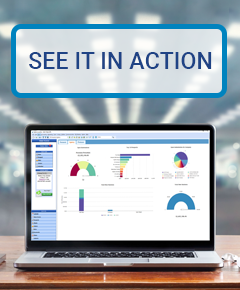Choosing an Agency Management System
Don’t let data conversion horror stories scare you – there are experienced insurance agency software providers out there. The trick is finding the capable ones amongst the dozens of options. Use these questions to vet potential providers, saving you from data conversion disaster.
Preliminary Questions
Q: Who will guide my agency through the conversion?
 What to listen for: Names and faces of specific point people. You should have at least one individual to guide you through the conversion process, and time to get to know them. You should feel comfortable with your point person and have regular communication. This openness and connection means you can ask any question, any time for a smooth transition.
What to listen for: Names and faces of specific point people. You should have at least one individual to guide you through the conversion process, and time to get to know them. You should feel comfortable with your point person and have regular communication. This openness and connection means you can ask any question, any time for a smooth transition. Warning signs: A revolving door of contacts where you’ll be passed off from one person to the next, or your first connection with your point person only taking place once conversion is underway.
Warning signs: A revolving door of contacts where you’ll be passed off from one person to the next, or your first connection with your point person only taking place once conversion is underway.
Q: What does the conversion process look like?
 What to listen for: Detailed process, timeline, and room to adjust. After speaking with the provider, you should either understand how they run the conversion process or feel comfortable enough to ask for clarity. And, the provider should emphasize adapting for agency specifics, planning to tailor the process to meet your needs. Finally the provider should convey expertise, pointing out potential problem areas and examples of how they supported other agencies through tricky spots. The key is to avoid any surprises, keeping you balanced throughout the process.[/vc_column_text]
What to listen for: Detailed process, timeline, and room to adjust. After speaking with the provider, you should either understand how they run the conversion process or feel comfortable enough to ask for clarity. And, the provider should emphasize adapting for agency specifics, planning to tailor the process to meet your needs. Finally the provider should convey expertise, pointing out potential problem areas and examples of how they supported other agencies through tricky spots. The key is to avoid any surprises, keeping you balanced throughout the process.[/vc_column_text] Warning signs: Little to no transparency on what the process entails or a convoluted plan with the bulk of the work put on your agency.
Warning signs: Little to no transparency on what the process entails or a convoluted plan with the bulk of the work put on your agency.
Q: Where will the conversion happen?
 What to listen for: Proximity to the provider during the conversion. Ideally the conversion will take place at your agency, but the important factor is that your point people are close by. This could mean the provider comes to you or they set up a virtual presence. The closer you are, the easier it is to addresses glitches and keep the process moving forward.
What to listen for: Proximity to the provider during the conversion. Ideally the conversion will take place at your agency, but the important factor is that your point people are close by. This could mean the provider comes to you or they set up a virtual presence. The closer you are, the easier it is to addresses glitches and keep the process moving forward. Warning signs: Outsourced conversion or a reluctance to travel to meet your agency’s needs.
Warning signs: Outsourced conversion or a reluctance to travel to meet your agency’s needs.
Q: When should I expect to get back to business as usual?
 What to listen for: A practical response. Too often providers over promise and under deliver. Look for one with a reasonable timeline, and the knowledge that each agency adapts differently.
What to listen for: A practical response. Too often providers over promise and under deliver. Look for one with a reasonable timeline, and the knowledge that each agency adapts differently. Warning signs: Promises that seem too good to be true or a one size fits all response.
Warning signs: Promises that seem too good to be true or a one size fits all response.
Get more transition and training questions here.
Follow-Up Questions
Once you’re satisfied with your initial questions, it’s time to get into the “nitty gritty” with the provider. Use these questions to go through the conversion processes with a fine-toothed comb, ensuring you make the best decision for your agency.
- How many conversions have you completed from my current management system? When was the last one?
- What is converted? Is there a test conversion?
- What issues can happen during conversion? How do we communicate them to you?
- What type of training will be provided for the transition? Online? Onsite? Blend of both?
- What guarantees are offered for data integrity in the conversion?
- What is included and what has an additional cost (i.e. data back-up/recovery, continuing education/trainings)
Overall, the answers to these questions should reflect an experienced, trustworthy provider that thinks ahead and adapts to your agency’s needs. If they’re unable to answer a question in the moment, a good provider will be honest about that and follow-up quickly with the information you need. Remember that you are looking for someone to partner with, a teammate who will work with you and invest in your agency’s success.
Read one Utah agency’s conversion experience here.
Make the Most of Your Conversion Experience
At SIS we see each client as a partner. Their success is our success. Our experienced sales and support team have guided our partners through over 500 conversions, walking side by side with each through the process. Plus, we’re one of the fastest in the business, transferring data in seven days or less. To find out more about our conversion process, contact us at 800.747.7005 or [email protected].

 What to listen for: Names and faces of specific point people. You should have at least one individual to guide you through the conversion process, and time to get to know them. You should feel comfortable with your point person and have regular communication. This openness and connection means you can ask any question, any time for a smooth transition.
What to listen for: Names and faces of specific point people. You should have at least one individual to guide you through the conversion process, and time to get to know them. You should feel comfortable with your point person and have regular communication. This openness and connection means you can ask any question, any time for a smooth transition.
